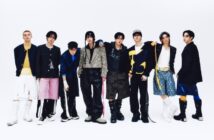Did you watch any of the South Korean films available on Netflix during out film festival? Here is Part Three of our reviews of the films. If you didn’t see any of them maybe this will have you heading over to Netflix to sample them!
WAR OF THE ARROWS – Reviewed by Lore Walsh
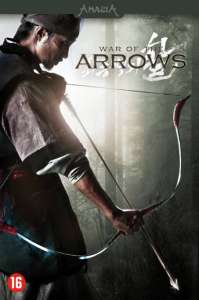
‘War Of The Arrows’ sometimes internationally referred to as ‘Arrow: The Ultimate Weapon’ is a 2011 historical action film by Kim Han about the second Manchu invasion of Korea in 1636.
A skilled archer, Nam Yi (Park Hae Il), takes on warriors from the Qing Dynasty in an attempt to save his younger sister Ja In (Moon Chae Won), who has been captured along with her new husband Seo-Goon (Kim Moo Yul) and all other surviving villagers.
‘War Of The Arrows’ is visually very strong, with the exception of one scene created using CGI that looks somewhat clumsy and out of place because it is very obviously done using the technology.
The masses of scenes in which arrows fly towards, and past, the camera keep the speed of the chase and fight that lacks any modern technology.
This is a period Korean film that both action fans and anyone just looking for an entertaining film. Its emotion, history and action should engross you in Nam Yi’s fight and provide you with a film you’ll surely remember.
———————–
THE WAY HOME – Reviewed by Ashleigh Gregory
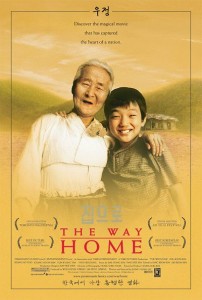
A truly unique and refreshing film made in 2002 and set in the countryside of South Korea, rather than the usual setting of Seoul. ‘The Way Home’ is the story of a badly behaved seven-year-old boy, Sang Woo (Yoo Seungho), who is sent to live with his grandmother in the country while his mother tries to find a job back in Seoul. The grandmother is mute which frustrates Sang Woo to no end and he is consistently cruel and mocking towards her, calling her ‘stupid’ for being unable to talk. Despite his horrible actions, she only ever shows him endless love and kindness. There are many occasions on which to the audience it seems that he really doesn’t deserve such patience, such as when he demands his grandmother buys him some sweets from a shop while they’re at the market, but then he refuses to ride the bus back home with her and makes her wait for the next one, but through it all the grandmother never gets angry.
It’s difficult to say much more about this film without giving too much away, but it is definitely a touching film that showcases the love and patience extended by grandparents towards their grandchildren.
I think this is the kind of film that could appeal to everyone, but especially the kind of people who like family-oriented films. If you’re looking for great romance or heaps of drama and fighting, then this probably isn’t the film for you, but if you’re after something with an original plotline and a beautiful setting then I couldn’t recommend this film more.
If you watch this film, be prepare to call your Nan afterwards to tell her you love her.)
———————–
SYMPATHY FOR MR. VENGEANCE no longer available on Netflix.com – Reviewed by Lore Walsh
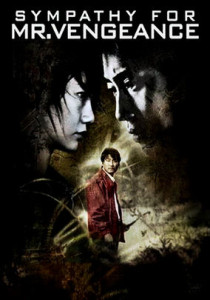
Park Chan Wook’s 2002 ‘Sympathy For Mr. Vengeance’ is the first part of The Vengeance Trilogy. The themes of revenge, violence and salvation and Park’s relationship with a strong acting cast that reappear in the series, as different characters, are the only things that link the trilogy. It is not thought Park set out to create a trilogy, as the films certainly aren’t a formal trilogy in the slightest. International critics labelled the films as such because of the strong themes that ran through the three works from the filmmaker.
‘Sympathy For Mr. Vengeance’ is a grim and brutal tale about revenge that doesn’t work out. The story follows Ryu (Shin HaKyun – The Front Line/JSA) a deaf and mute man caring for his sister who desperately needs a transplant. Willing to do anything he can to save his sister knowing he isn’t a suitable donor Ryu finds himself turning to solutions that can only end in the worst way.
Most people will have seen ‘Oldboy’ before seeing the other films in the trilogy. ‘Mr Vengeance’ is possibly more striking visually than ‘Oldboy’. As Ryu is both deaf and unable to talk all his emotions and anything that would normally be spoken by a lead character is portrayed beautifully through the visual.
Both Ryu and Park Dong Jin (Song Kang Ho – Thirst/The Host) commit acts of violence during the film but the scenes in which their emotions are portrayed in silence do mean you connect with them and most likely will feel sympathy for them even though they are carry out their acts of vengeance.
‘Sympathy For Mr. Vengeance’ does contain scenes of extreme violence and deaths which some may find sensitive topics. This film however, and the whole of the trilogy, is the work of a filmmaker that shouldn’t be missed.
———————–
LADY VENGEANCE – Reviewed by Holly Smith
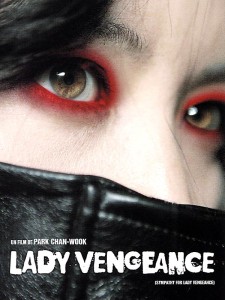
‘Lady Vengeance’ or ‘Sympathy For Lady Vengeance’ is a 2005 film directed by Park Chan Wook. It is the third instalment in the director’s “Vengeance Trilogy”, following ‘Sympathy for Mr Vengeance’ and ‘Oldboy’. As you may have guessed, all three share the theme of gaining revenge on others, but they are not otherwise linked.
The film begins with a beautiful young lady called Lee Geum Ja (Lee Young Ae) being released after a long stint in prison. It is revealed that she was arrested for the crime of killing a small child.
Geum Ja is seemingly very detached from the outside world, instead pouring all of her focus into a single mission of revenge on a certain someone.
She begins to call upon favours from past fellow prison inmates, all of whom mention to Geum Ja that she has changed since they last saw her and how the bright shade of red eye shadow the woman now adorns daily does not suit her.
As we are slowly filled in on the protagonist’s past we realise that she is actually an incredibly kind and maternal individual, always caring for those around her in the most gentle way. It is precisely for this reason that no one can refuse to fulfil Geum Ja’s every request, despite how unsettled they are by her new appearance.
As time goes on the layers of Geum Ja are stripped further and further back. But many questions remain. Why does she want revenge and on whom? And will she get it in the end?
GOOD POINTS
- The cinematography for this entire film is totally breath-taking. It is so creative and probably the most interesting I have ever seen. Park Chan Wook has a very unusual style in the way he films things. He uses often very abstract techniques to communicate narratives in an otherwise very realistic setting. However, this juxtaposition of styles somehow doesn’t leave viewers confused or disorientated, perhaps because the messages he is trying to get across during these scenes come out so clear.
- One of the things I love about this film, as with most East Asian films in general, is that you do not have a clear-cut “Good guy” and “Bad Guy” character dynamic at play that you tend to see in a lot of films and stories. This portrayal is all well and good in some cases, inside a comic book for example, but it has been done so many times over the years that it can now get a little boring. I feel that humans are neither all good nor all bad and the characters in this film are perfect examples of this. Geum Ja is like an onion and as you peel away the layers, you are left with a very complex character. She has made mistakes, but has learnt from them and they inform her present decision-making.
- The relationship between Geum Ja and her young daughter Jenny (Kwon Yea Young) is wonderful. Geum Ja had Jenny taken away from her when she was imprisoned and the years apart, as well as the feeling of neglect that resides inside Jenny makes for very unsettled foundations between the two. Despite this, the general push-and-pull between them will leave you with a heart-warming feeling.
- All the actors in this film were great, but I would especially pick out Lee Young Ae and Choi Min Sik (plays character Baek Han Sang) for their spectacular performances. They make the characters so believable, you truly forget that they are acting – what more can you ask for from them?
- There were some strangely humorous moments, which – again – is something that is quite common in East Asian films. These sorts of moments are the kind where you find yourself laughing, but then wonder if that was the intended reaction. It can be quite unsettling when you have adjusted to a very serious piece, but I think it takes some very clever writers to be able to slot this comedy into such an unfitting mould. It also helps viewers to cheer up slightly, which can be needed in very intense films such as this one.
- One of the messages that I personally took from this film is that happiness is something that isn’t always given to you, but rather something you can work for. Geum Ja is, understandably, a very broken and hurt individual after her imprisonment. But she works towards her goal of revenge and only makes those suffer who truly deserve it. She brings happiness to many other people in the process (albeit, by very gruesome means) and in that way, she can lift some of the weight that has resided upon her shoulders for so many years. Now, I am not suggesting that everyone should go and seek revenge on those that have wronged them (please don’t!), but rather pointing out that it is so good to see that there is hope for even someone as destroyed and empty as Geum Ja.
- Last, but most certainly not least, the narrative of this film is great! It is not transparent and requires viewers to piece things together for themselves, but it is equally not overly confusing or non-linear just for the sake of it. The way that each little bit of information is leaked out to the audience bit by bit will really encourage you to get absorbed fully into the viewing experience. The feeling of satisfaction you get when everything becomes clear also makes all the effort worthwhile.
BAD POINTS
- There was a technique used to enable Geum Ja and her daughter Jenny to have a conversation, despite the fact that they actually spoke different languages since Jenny was raised by adoptive parents in Australia. When each character talked, a subsequent translation was given in each listener’s native language. My criticism is that the audio was not very clear in these translations and it became very difficult to understand the English and what was being said in general when you are trying to listen and read subtitles at the same time. Having said this, the film was obviously not originally made to cater to non-Korean speakers like myself, so it is understandable that this scene was a bit hard for me to understand.
OVERALL
Fans of Park Chan Wook’s other work will undoubtedly be delighted with this piece. He has a knack for creating something entirely new, but completely steeping it in his particular flavour and style. He really brings back the idea that film-making is a form of art, a sentiment that a lot of films have lost over the years.
I will admit that I personally probably wouldn’t have watched this film if I wasn’t initially pushed to. Being someone that uses film as a form of escapism, the generally depressed and dirty images that the “Vengeance Trilogy” presents did not entice me. However, I am now glad to have ventured out of my comfort zone and given this one a try. It is a sad and, unfortunately, in some ways realistic story being told here, but it is the way it is told that makes it worth the watch.
It is a very violent, gruesome and gory film that includes a few sex and sexually-orientated scenes, so it is definitely not one for the faint-hearted among us. However, if you are bold and brave enough to face all that, I am sure that the quality of this film will shine through to you.
Sidenote: Park Chan Wook cast Choi Min Sik as one of the main characters? Min Sik was the lead in ‘Oldboy”! Reminds me slightly of the Tim Burton/Johnny Depp relationship… 😛
———————–
Want to tell us what you thought of these movies? Comment below!
Remember – commenting on our articles gets you points and points might help you when we’re having giveaways
Netflix.com features two other films in their Korean movie selection: 71: Into The Fire and Oldboy [Oldboy being the 2nd film in the Vengeance trilogy] You can find our reviews for these films in the UnitedKpop Film Guide where you’ll also find reviews for a whole host of other films you might enjoy! Written by Holly Smith and Ashleigh Gregory.



